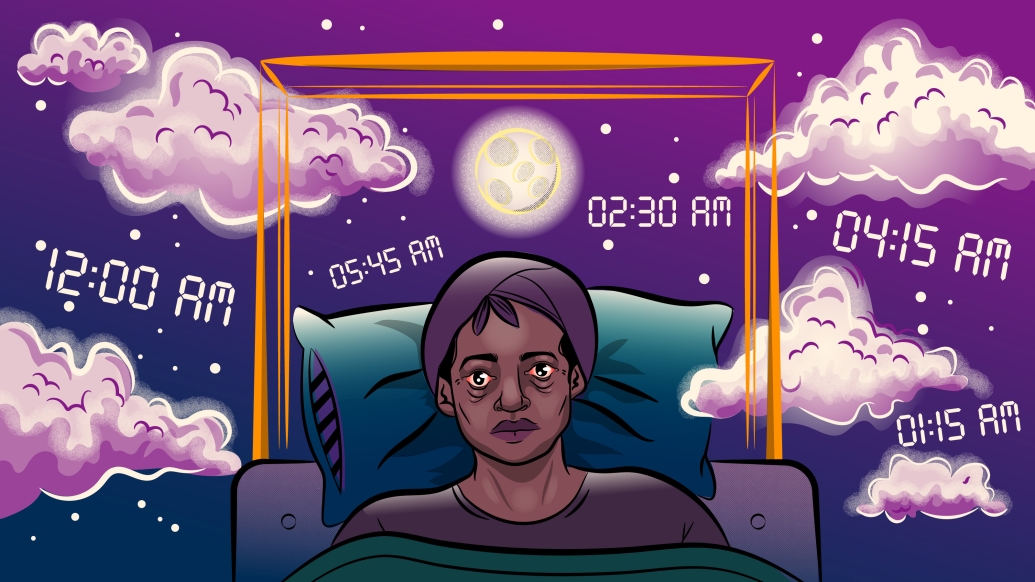An online class helps individuals learn about sleep disorders and the value of good sleep habits
5:00 AM
Author |

This story originally ran on June 13, 2024.
The average person spends one-third of their life sleeping.
But what we actually know about sleep pales in comparison.
In fact, said Ronald Chervin, M.D., a professor of neurology and director of the Sleep Disorders Centers at Michigan Medicine, “So much time is spent teaching our youth about the importance of exercise and nutrition while sleep education is often overlooked in schools.”
And this lack of information about sleep health also applies to a surprising number of adults, he says.
But Chervin and a team of Michigan Medicine sleep specialists want to change that.
They’ve developed a course focused on raising awareness and understanding of sleep health, sleep disorders and their consequences, which can range from physical and mental health risks to impaired functioning on a daily basis.
The online course, From Sleep Disorders to Sleep Health, is led by Chevrin along with Michigan Medicine sleep faculty Shelley Hershner, M.D., and Megan Acho, M.D., and is taught by sleep clinicians and national academic leaders at the University of Michigan with guest experts from several other institutions.
“The course is designed for all ages and professions,” said Chervin.
So much time is spent teaching our youth about the importance of exercise and nutrition while sleep education is often overlooked in schools.” — Ronald Chervin, M.D.
“We realized there was an opportunity to create an educational resource for those eager to learn more about their own sleep, as well as those who might want to teach others about ways to optimize sleep health.
“As sleep specialists, we’ve discovered there's a hunger for more information,” he said.
“We believe this course satisfies that hunger.”
The course covers more common sleep disorders such as sleep apnea, insomnia and narcolepsy, as well as many other illnesses and factors that hinder good sleep and can negatively impact quality of life and overall wellness.
The course, Sleep Disorders to Sleep Health, addresses:
- Ways to obtain healthy sleep and the barriers that can prevent it
Sleep throughout a person’s lifespan, including specific sleep strategies for children through older adulthood
- The impact of sleep issues in diverse populations, environmental challenges to sleep and the relationship between sleep and various health conditions
- Ways in which you can be evaluated and treated for sleep disorders
The need for sleep health education, according to the U-M team, was evident based on a variety of considerations.
“First, we realized that people don't actually have access to a lot of education about sleep,” says Chervin.
“Second, many don’t realize that sleep is fundamental to good health and to avoiding many chronic disorders that arise in an individual’s lifespan. And finally, we realized the need to draw attention to how sleep is impacted by disparities, including environmental and socioeconomic.”
Chervin cites two examples of consequences of sleep disorders that are often not addressed.
“A child may be treated for ADHD with stimulants for years before their sleep disorder is found,” he said.
“And once you treat their sleep disorder, our research has shown that a year later, approximately half of those who originally qualified for a diagnosis of ADHD no longer do.”
He also points out individuals with undiagnosed sleep apnea who might experience high blood pressure, diabetes or a heart attack yet remain unaware that these conditions may have been exacerbated by their sleep disorder.
Chervin believes the new course will lead to more productive patient-doctor conversations as well as an understanding of the many types of sleep disorders, their impact and effective methods of treatment.
Access the free From Sleep Disorders to Sleep Health course.

Explore a variety of health care news & stories by visiting the Health Lab home page for more articles.

Department of Communication at Michigan Medicine
Want top health & research news weekly? Sign up for Health Lab’s newsletters today!





